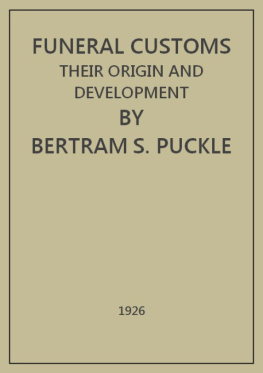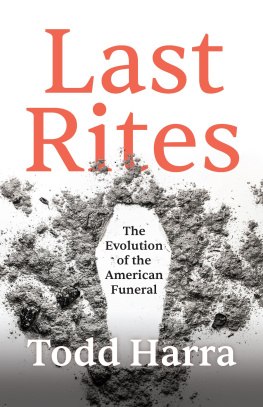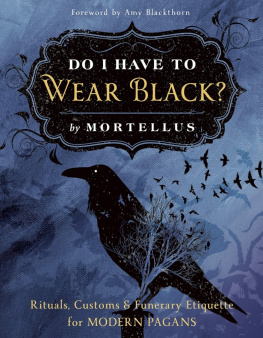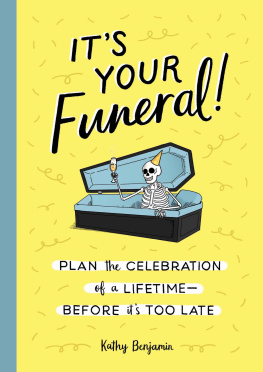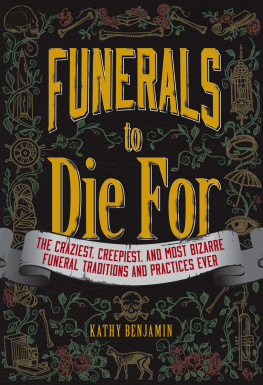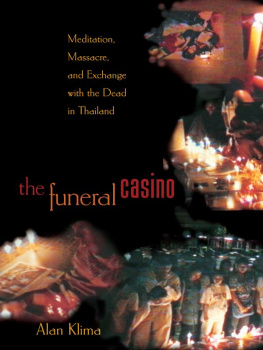
Funeral Customs By Bertram S. Puckle
FOREWORD
AN exhaustive treatise on funeral customs, ancient and modern, has yet to be written.
Leaving to the theologian and philosopher the thankless task of assigning the mystery of death its proper place and functions in the scheme of creation, the writer has confined himself to a general survey of those practices which surround the physical fact of death, a subject which is as immense as it is fascinating.
Whilst investigation shows that almost all our present usages have their origin in stupid pagan superstitions, they have none the less an interest of their own to record.
It is a wholesome sign that a more enlightened public is slowly releasing death from much of its ugly trappings, for--"Death, beautiful in itself, is only made terrible by groans and convulsions and a discoloured face, and friends weeping and blacks and obsequies." So wrote Bacon three hundred years ago in his "Essay on Death." "But above all, believe me," he concludes, "the sweetest canticle is Nunc Dimittis."
BERTRAM S. PUCKLE.
RICHMOND,
August 30th, 1926.

Funeral Customs By Bertram S. Puckle
ACKNOWLEDGMENT
THE Author wishes to express his sincere thanks to many friends who have helped him with this book. In particular, he would mention the following public bodies, firms and individuals who have lent pictures for reproduction: Messrs. J.D. Field & Son (for some particularly interesting material, including the 1824 funeral cost account), Messrs. J. Lyons & Co. Ltd., Messrs. Odhams Press Ltd., the Trustees of the British Museum, the Cremation Society of England, Mr. Emery Walker, Mr. John Tussaud, Mr. W. R. Leech, Mr. W. Edgel, Mr. Francis J. Bigger and Mr. Edward Good.

Funeral Customs By Bertram S. Puckle
CHAPTER I.THE PROVISIONS OF NATURE
IN the animal kingdom a dead body arouses no feelings of fear or repulsion. In most cases it is looked upon as a generous gift of Nature, of which the fullest advantage is to be taken, or the opportunity lost to competition.
It is difficult to appreciate how vast a number of birds, beasts and insects inhabit the fields and woods, and we may well ask ourselves the question "What becomes of their dead?" In a day's search we may not find among all the teaming wild population a single stiffened body, or one bright eye glazed in death. Here in a clearing we may have chanced upon some blood-stained grass, and a few scattered feathers, which gave evidence of the hawk or carrion crow, but this is very far from accounting for anything like the greater proportion of the short-lived race.
Has Nature, then, her undertaker? Certainly she has. He is appropriately known as the Necrophorus mortuorum, or more popularly as the sexton beetle, for he is equipped with spade and all that is necessary for "undertaking."
There is much that the human variety might learn from this humble and industrious insect. Whilst he is dressed in a conventional garb of black, he seeks to enliven matters by means of two broad bands of yellow on his back. He is cheery, and when his duties are over for the day he indulges in a little music, not perhaps entirely a matter of art for art's sake, but like most joyous notes of nature, his immediate object is to attract the attention of the opposite sex.
In praising the Necrophorus mortuorum, we must admit that in his work he is not actuated by motives of disinterested philanthropy any more than is the case with the human undertaker.
Nature is indeed far too wise to entrust any important work to the spasmodic efforts of the well-intentioned. If she wants a job done thoroughly, she does not grudge a reasonable wage for services rendered.
If during our lives we are often able to disguise from ourselves that we are but superior animals, the disabilities of birth and death bring the fact unmistakably before us.
The helplessness of a new-born babe is proverbial, but Nature has provided it with the means of making its urgent necessities unmistakably apparent, and she has not been less considerate to the corpse.
We must not be shocked to hear that it is by means of the olfactory organ that the sexton beetle is made aware of the proximity of a new "client." Once having sensed a job, he communicates the good news to his wife, and together they fly off to the house of mourning by the shortest possible route--for competition is keen.
Arrived at the spot, they find the corpse to be that of a recently deceased mouse.
"Having feasted," other helpers having also arrived, the male beetle proceeds to excavate around the body, till by a process of gradual undermining it sinks into a considerable hollow, thus prepared for its reception.
The work is finished by piling the earth neatly on the top.
For the purpose of excavation Nature has provided the sexton beetle with club-shaped antennae, which are supported by strong muscles equal to the work that they are called upon to perform. It should be stated that Mrs. Beetle remains in possession of the body in which her eggs are laid. Surely this is a sanitary and logical conclusion to a commonplace event, in which everybody concerned is paid off and satisfied.
It teaches a lesson that burial is a natural method of disposing of the dead, and it gives more than a hint, that believe what we will of the prospects of a future life, death is only a rather misleading term for a changed, by no means an impaired, activity.
It will be self-evident that in dealing with the larger animals, such as bears, lions, etc., the sexton beetle, however numerous and industrious be his kind, would be sorely taxed if he received a call from a client. We must not, however, under-rate the extraordinary power of the insect world when working together with a common objective.
In the jungle the greater feeds on the lesser, and the jackal and vulture scavenge what remains.
The busy workers living in organized communities deal with their dead on lines more akin to human necessities. Their own dead, or a chance intruder into the ant-hill city, will be treated with system and dispatch, and the body removed long before it has any opportunity to prove offensive or dangerous to the community.
The ants, being carniverous, will quickly devour any beasts or insects which may die near their nests, and if anything uneatable remains, a squad of workers will be summoned at once to remove the offence to some more convenient place.
The bee, having no use to make of the body, has but one idea, and that is to expel the corpse, or so deal with it that the carefully regulated atmosphere of the hive shall not suffer from the presence of any poisonous fumes.
The workers of their community who are set apart for scavenging purposes, will soon eject a body by shouldering or pushing it out of the hive. If the intruder be a slug or snail, it may happen that it has climbed into such a position that its bulk will render it impossible for the bees to deal with it in the ordinary manner. In such a case the unhappy adventurer is quickly walled up with wax in the position in which he is found, and the tomb hermetically sealed past all fear of any harm to the city.
At exactly what period superstition affected death and burial, it is of course impossible to say. Perhaps it was taught to man by the sigh of the wind in the trees, or the dramatic terrors of the thunderstorm--however it came about, we know that the possibility of a spirit world was an early consideration.
Next page
